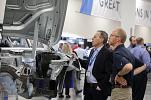Editor-in-Chief
- FMA
- The Fabricator
- FABTECH
- Canadian Metalworking
Categories
- Additive Manufacturing
- Aluminum Welding
- Arc Welding
- Assembly and Joining
- Automation and Robotics
- Bending and Forming
- Consumables
- Cutting and Weld Prep
- Electric Vehicles
- En Español
- Finishing
- Hydroforming
- Laser Cutting
- Laser Welding
- Machining
- Manufacturing Software
- Materials Handling
- Metals/Materials
- Oxyfuel Cutting
- Plasma Cutting
- Power Tools
- Punching and Other Holemaking
- Roll Forming
- Safety
- Sawing
- Shearing
- Shop Management
- Testing and Measuring
- Tube and Pipe Fabrication
- Tube and Pipe Production
- Waterjet Cutting
Industry Directory
Webcasts
Podcasts
FAB 40
Advertise
Subscribe
Account Login
Search
Taking a working break from free trade
- By Dan Davis
- November 13, 2009
Unfortunately, the past decade hasn't been a stellar one for job creation. If you take a look at the private jobs in the U.S. in September 2009, a little over 109.1 million, and compare that to the number in September 1999, about 109.7 million, you are left with an empty feeling. If you consider that the overall population grew 9 percent during that same time, you have an even emptier feeling.
You won't be surprised to learn that the number of government employees grew during this time from 20.2 million in September 1999 to 22.3 million in September 2009. Now that takes into account everybody from letter carriers to teachers. You can slice and dice the statistics here to find a number that you can then share with your other tea party-goers.
This bit of historical perspective about job loss is especially discouraging as the last decade was also the decade of free trade. The North American Free Trade Agreement went into effect in 1994, and George W. Bush was a proponent of free trade agreements with several other nations.
Today free trade advocates in the U.S. are pushing for the removal of more barriers and an end to the perceived hostilities aimed toward China's way. They contend that the fastest way out of this economic slump is to boost U.S. exports, and the only way to do that is to end protectionist proselytizing. They also think that it'll get the job creation machine revving again.
So you can see where people might have some hesitation believing that last claim. The free trade advocates can't, however.
I actually think the free trade advocates are correct for the most part. You can't turn back the hands of time, so I accept that this is a nation that has committed to free enterprise and works best when companies are able to compete without governmental interferences. However, I also realize that this is a very confusing time when it comes to international trade, particularly with China.
I'll let Hank Cox of the National Association of Manufacturers explain, as he did in "Too Dowdy to Behold" in the November/December 2009 issue of the Metal Service Center Institute's Forward magazine:
"We"ve had disagreements among our members about what the appropriate stance on China ought to be. It"s a given that China violates all the rules of international trade, they manipulate the value of their currency, they subsidize domestic industries, they violate copyrights.
"But we are international. We think international trade is good for everybody. And remember, 95% of the world"s consumers are not in the United States. If we want to grow consistently in the long term, we need open trade.
"The real reason we can"t come to grips with China is that we depend on them to subsidize our profligacy. The only way to cover those trillion-dollar deficits is investment from China. We made a devil"s bargain because of our unsustainable fiscal policies.
"So you can"t ignore China. You can"t shut it out. It has 1.3 billion people who are coming on strong. If you want to have a healthy and vibrant economy, you need a manufacturing base and access to that market."
That sums it up nicely. The U.S. is stuck between accessing an attractive market and all the illegal and immoral activities that have to be ignored to have access to that market. I can understand why a nation might want to take a step back and rethink its position in this awkward relationship. So what we have now is not so much a period of protectionism, but what I like to call a moment of rest and review.
Truthfully, the creation of thousands of jobs is likely to come with a boost in consumer and business management confidence, which will be difficult considering the tumult associated with health care reform and potential greenhouse gas regulation. I doubt the job numbers will spike with the likes of another U.S.-Oman free trade accord.
subscribe now

The Fabricator is North America's leading magazine for the metal forming and fabricating industry. The magazine delivers the news, technical articles, and case histories that enable fabricators to do their jobs more efficiently. The Fabricator has served the industry since 1970.
start your free subscriptionAbout the Author

Dan Davis
2135 Point Blvd.
Elgin, IL 60123
815-227-8281
Dan Davis is editor-in-chief of The Fabricator, the industry's most widely circulated metal fabricating magazine, and its sister publications, The Tube & Pipe Journal and The Welder. He has been with the publications since April 2002.
- Stay connected from anywhere

Easily access valuable industry resources now with full access to the digital edition of The Fabricator.

Easily access valuable industry resources now with full access to the digital edition of The Welder.

Easily access valuable industry resources now with full access to the digital edition of The Tube and Pipe Journal.
- Podcasting
- Podcast:
- The Fabricator Podcast
- Published:
- 04/30/2024
- Running Time:
- 53:00
Seth Feldman of Iowa-based Wertzbaugher Services joins The Fabricator Podcast to offer his take as a Gen Zer...
- Industry Events
16th Annual Safety Conference
- April 30 - May 1, 2024
- Elgin,
Pipe and Tube Conference
- May 21 - 22, 2024
- Omaha, NE
World-Class Roll Forming Workshop
- June 5 - 6, 2024
- Louisville, KY
Advanced Laser Application Workshop
- June 25 - 27, 2024
- Novi, MI































